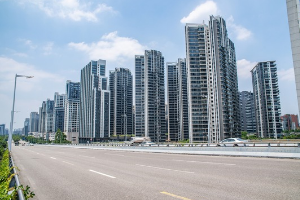Buying a home near a highway may seem like a convenient option, especially for those who commute regularly or want better connectivity to major parts of the city. These properties are often priced lower and may offer easy access to commercial hubs, making them attractive to both homebuyers and investors. However, they also come with certain trade-offs, such as noise pollution, safety concerns and long-term livability issues. So, is buying a property near a highway a smart decision? This article explores the pros and cons in detail and highlights key factors to consider before making such a high-stakes investment.

Benefits of buying a property near a highway
Buying a property near a highway can offer several advantages, especially for individuals who value connectivity and convenience. From better commute times to potential investment benefits, here are some reasons why such a location may be appealing:
1. Better connectivity
Properties located near highways usually have excellent access to major roads and transportation networks. This ensures easier and faster commutes to important places such as business districts, industrial hubs, airports, and educational institutions. For those who rely on road travel frequently, living near a highway can significantly reduce travel time and offer flexibility in reaching multiple destinations.
2. Affordable pricing
In many cities, properties near highways are more affordable compared to those located deeper within residential neighborhoods. This pricing benefit can be a strong incentive for first-time homebuyers or middle-income families looking to own a home without stretching their budget. It also makes such properties attractive from an investment standpoint, offering entry into growing localities at a lower cost.
3. Potential for appreciation
As cities expand and infrastructure develops, areas near highways often see rapid urbanisation and growth. With ongoing infrastructure upgrades like flyovers, metro connectivity, or commercial development, these locations tend to appreciate in value over time. If chosen wisely, buying a highway-adjacent property can lead to long-term capital gains.
4. Investment and rental demand
Well-connected areas draw more tenants, especially working professionals, students, and business travelers, who prefer ease of commute over quieter surroundings. Properties near highways often offer better rental yields, as demand remains steady due to the location’s accessibility and convenience. This makes them an attractive option for real estate investors looking for regular rental income.
5. Proximity to amenities
Highway zones are often hotspots for commercial activity. Residents living near highways benefit from easy access to petrol stations, restaurants, shopping complexes, emergency services, and 24/7 convenience stores. Over time, such areas tend to become self-sustained neighborhoods with most amenities available within a short distance.
Drawbacks of buying a property near a highway

While living near a highway has its advantages, it also comes with several potential downsides that buyers should carefully consider. These factors can affect daily comfort, long-term livability, and even resale value.
1. Noise pollution
One of the most common drawbacks of living near a highway is constant noise. The sound of vehicles, honking, and heavy trucks, especially at night, can disrupt sleep and lead to long-term stress. Even with soundproofing measures, some level of noise tends to filter through, making it challenging for families with children or senior citizens.
2. Air pollution
Highways see heavy vehicular traffic, which increases air pollution levels in nearby areas. Prolonged exposure to exhaust fumes, dust, and particulate matter can affect respiratory health, particularly for those with asthma, allergies, or other lung conditions. This is a significant concern for families with young children or elderly members.
3. Safety concerns
Properties near highways may be at greater risk of road accidents due to high-speed traffic. In areas without proper pedestrian infrastructure, crossing the road or navigating driveways can be dangerous. Also, for families with young children or pets, living close to a highway can raise safety concerns.
4. Lower residential appeal
While these areas may be suitable for short-term rentals or commercial purposes, many homebuyers prefer more peaceful, interior residential localities. This can limit the future resale market to a smaller pool of buyers, possibly impacting capital appreciation in the long run. Certain buyers may also view proximity to a highway as a negative, leading to slower resale.
5. Dust and maintenance issues
Dust from constant road activity settles faster on windows, balconies, and home interiors, especially on lower floors. This increases the frequency of cleaning and maintenance, which can be both time-consuming and costly over time. It can also dull the aesthetic appeal of outdoor spaces like balconies or gardens.
Factors to consider before buying a property near a highway
While the pros and cons give a broad view, buyers must also consider practical, legal, and personal factors before finalising a highway-adjacent property.
- Noise and air pollution levels: Living close to a busy highway often means dealing with constant traffic noise and increased air pollution. Before buying, visit the property at different times of the day to assess how noisy or polluted it gets, especially during peak traffic hours. Also, check if the building design incorporates soundproofing features or air filtration systems.
- Distance from the actual highway: Not all “near-highway” properties are the same. A home 100 meters away from the road may be significantly more affected than one 500 meters away with a buffer of trees or commercial buildings. The exact distance and what separates the property from the highway can make a big difference in livability.
- Safety and accessibility: Highways can improve connectivity, but they can also create safety concerns, especially for families with children. Assess whether there are safe pedestrian crossings, service lanes, or barriers separating residential areas. Also, evaluate how easy it is to access the highway as proximity shouldn’t come at the cost of dangerous entry or exit points.
- Future infrastructure plans: Check local development plans to understand how the area around the highway is expected to evolve. Upcoming flyovers, service roads, metro lines, or commercial hubs can boost property value, or bring in more congestion. Speak to local authorities or check the city’s master plan before committing.
- Property type and usage: If you’re buying the property for self-use, comfort and quiet may be more important. But if the goal is to set up a business, a highway-facing property might actually be advantageous. Similarly, investors may find rental demand for such properties from logistics workers or small business owners.
- Resale potential: Properties near highways can be polarising. While some buyers are drawn to convenience, others may be deterred by noise or pollution. It’s crucial to assess how easy it will be to resell the property, and whether it will appeal to your target demographic in the future.
- Legal clearances and zoning: Ensure the property has all the necessary approvals and isn’t caught up in legal disputes over highway expansion, land acquisition, or change in land use. Verify zoning laws to confirm the property is officially designated for residential use.
Who should consider buying a property near a highway?
Properties near highways may not suit every buyer, but for certain individuals and groups, the location can offer specific advantages that outweigh potential drawbacks.
- Daily commuters: People who drive long distances to work, especially those commuting between cities or industrial hubs, can benefit from quick access to highways. Shorter travel times, reduced fuel costs and easier navigation through bypass roads make such properties ideal for frequent travelers.
- Commercial property buyers: High visibility and accessibility are key for businesses like showrooms, restaurants, warehouses, or logistics services. Highway-facing properties are often preferred for their exposure to high traffic volumes, helping businesses attract customers and ensure smooth operations.
- Investors focused on rental income: Highway-adjacent areas often attract tenants who value affordability and connectivity over luxury. These include truck drivers, delivery personnel, migrant workers, and budget-conscious renters. Investors looking for stable rental yields can find such locations promising, especially near transport hubs or employment zones.
- Buyers seeking lower property prices: Properties near highways tend to be more affordable compared to similar options located deeper inside residential zones. Budget homebuyers willing to compromise slightly on ambience or noise levels may find better space, newer construction, or larger plots for the same price.
- Future-oriented buyers: Those planning for long-term gains may target areas near upcoming highway expansions or infrastructural developments. If the surrounding region is poised for urban growth, buying early could lead to significant appreciation in property value over time.
Housing.com POV
Buying property near a highway is not a simple yes-or-no decision. It’s a strategic choice that depends on your lifestyle, purpose and long-term outlook. While highways offer unmatched connectivity and potential for faster appreciation in emerging corridors, they also bring trade-offs: noise, pollution and safety concerns. What’s often overlooked is how these locations evolve. Many areas once considered “too close to the highway” are now bustling micro-markets, supported by smart infrastructure and improved livability. The real opportunity lies in identifying these inflection points early, where connectivity meets future-ready planning. That’s where data, not just instinct, should guide the decision. A property near a highway may not check every box today, but with the right timing and location, it could shape your tomorrow.
FAQs
Does being near a highway affect home insurance premiums?
Yes, proximity to a highway may slightly impact home insurance premiums due to increased risk of noise-related damage, air pollution, or vehicular accidents. However, the difference is usually minor and varies by insurer and city.
How does highway proximity affect property resale value?
Highway-facing properties can attract investors and commercial buyers, often leading to better resale prospects. However, resale may take longer in residential-heavy markets if noise or air quality are major concerns for buyers.
Are there legal restrictions on residential development near highways?
Yes, local development regulations often specify minimum setbacks from highways, noise barriers, and height restrictions. Buyers should verify approvals and compliance with zoning laws before investing near national or state highways.
Can highway expansion impact nearby properties?
Future expansion projects may lead to land acquisition, altered access roads, or increased noise. It's wise to check with local authorities for upcoming infrastructure plans before finalising a purchase near a major highway.
Are highway-adjacent properties suitable for senior citizens or retirees?
These locations may not be ideal for retirees due to safety risks, high noise levels, and limited walkability. A quieter, greener location with healthcare access and less vehicular activity might offer better comfort for senior living.
| Got any questions or point of view on our article? We would love to hear from you. Write to our Editor-in-Chief Jhumur Ghosh at jhumur.ghosh1@housing.com |







